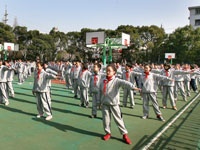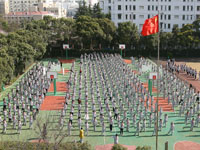预一英语期末复习概要
6A,M2,U6的知识点
1. travel---travels---travel(l)ing---travel(l)ed---travel(l)er
Light travels faster than sound.
2. hour
half an hour 半小时 school hours 上课时间
office hours 办公时间 business hours 营业时间
golden hours 黄金时光 dark hours 艰苦的时刻
3. half an hour 在句中,前面要用for等介词来连接。
e.g. They waited for the bus for half an hour.
4. It takes me about 10 minutes to get there.
-----How long does it take you to get there?
1) How long “多久,多长时间”,用于提问时间长度。
e.g. How long do you sit on the bus?
How long will you stay at home?
2) It takes sb.(宾格) some time to do sth. “某人花多长时间做某事。”
= sb.(主格) spend ….(in) doing sth. / sb.( 主格) spend ….on sth.
e.g. It takes me about 2 hours to finish my homework. every day.
=I spend about 2 hours in finishing my homework. every day.
= I spend about 2 hours on my homework. every day.
It took her 5 hours to find her dog.
=She spent 5 hours in finding her dog.
=She spent 5 hours on her dog.
5. advertisement
put an advertisement in the newspaper
6. a few “几个,一些”,后加可数名词复数= some,
There are a few students in the classroom.
a little “几个,一些” 后加不可数名词=some
There is a little milk in the bottle.
quite a few “相当多的,许多的” = many
He has quite a few toy guns.
only a few “仅仅几个,一些”
She has only a few toys.
7. a lot of = lots of = plenty of = many/much 后面加可数名词复数或不可数名词
e.g. John has painted a lot of pictures.
Peter spent a lot of time on the computer.
8. I go to school by bus, then on foot.
Then在此指“然后”,用来连接两个相同的成分。
9. I see some restaurants, a few shops and a lot of people when I’m on the bus.
When 不是疑问副词“什么时候”,而是一个连词,指“当。。。的时候”,引导时间状语从句。这时要注意---主从句时态的一致性。
Simon sees some shops when he is walking to school.
It was raining heavily when school was over yesterday.
She will become a teacher when she grows up.
10. light rail “轻轨”
go by light rail = take the light rail
6A,M2,U7的知识点
1. rule: follow the school rules 遵守校规
house rules 家规
2.---Where do we have rules?
---We have rules in the classroom/library/park/street.
We have rules on the road.
3. keep quiet “保持安静”
1)keep 后可直接加形容词 , e.g. keep slim
2)keep + sb./sth. + adj. “使。。。怎么样” e.g. keep our classroom clean
4. We mustn’t run across the road.
1) mustn’t do sth. = don’t do sth.
We mustn’t run around the classroom.= Don’t run around the classroom.
2) must do sth. = do sth.
We must put up our hands when we ask questions.
= Put up our hands when we ask questions.
3) across是介词, “穿过”, 指从一边到另一边。 (v.) cross
Erna is going to swim across the English Channel.
Walk across the road when the green man is on.
5. enter v. -----entrance n.
enter = go / come into ,
Don’t enter without knocking.
The train entered the tunnel.= The train went into the tunnel.
6. loudly adv. “大声地” ------ loud adj.
(反义词)quietly
e.g. The lady always speaks very loudly.
7. mean v. “意思” What does that word mean? 那个词什么意思?
What do you mean by “fugo”?你说的“fugo”是什么意思?
--- n. meaning “意思” What’s the meaning of that word?
8. sign n. “标志” Where can we find these signs?
v. “签名” Where can I sign my name?
9. on the left “在左边” Put the flower on the left.
on the left of… “在。。。左边” The classroom is on the left of the office.
10. 类似区别:on the right 与 on the right of, in the center与 in the center of,
in the middle与in the middle of
11. upstairs adv. “在楼上,到楼上” --- (反义词) downstairs
go upstairs, run upstairs, walk upstairs
12. We’re entering the centre. “我们就要进购物中心了。”
go / come/ leave/ enter 的现在进行时可表示将来的时态。
e.g. The bus is coming.
We are going to the beach tomorrow.
13. one 不定代词, 指前文中提过的某一同类的物品, 为单数。
e.g. ---Which dress do you like?
---This one.
ones 是one的复数,
e.g. ---Can I borrow some books from you?
---O.K. Which ones?
14. in class “在课上” listen to teachers in class
In the class “在班级中”Miss Wang is in the class.
6A,M3,U8的知识点
1.noodle 一般情况下都用复数形式noodles.
e.g. The noodles taste very nice.
2. seafood 不可数名词
e.g. It’s expensive to have seafood.
3.steam v. “蒸,煮 ” My mother always steams some fish for dinner.
steamed adj. “煮过的,蒸过的” steamed prawns steamed eggs
steam n. “蒸汽”
4. also “也”,一般放在动词之后,行为动词之前。
e.g. There are also 5 boys in the group.
They also went to see the film.
too “也”,一般放在肯定句的句末。
e.g. There are 5 boys in the group, too.
either“也”,一般放在否定句的句末。
e.g. They didn’t go to see the film, either.
5. kind 1)种类
what kind of car (what kind of 后可接单数)
what kind of people (what kind of 后可接复数)
ten kinds of cakes (超过一种, kind用复数)
2)和蔼的
Be kind to others.
6. fry v. “油炸,油炒”
e.g. Fry some eggs for breakfast.
fried adj. “油炸的”
e.g. Don’t eat too much fried food.
7.bacon 不可数名词, “咸肉, 熏肉” fried eggs with bacon
8. What would you like for dinner tonight?
= What do you want for dinner tonight?
1) would like sth. = want sth.
e.g. I’d like some water. = I want some water.
2)would like to do sth. (= want to do sth.)
e.g.I would like to chat with you over a cup of coffee.
I want to chat with you over a cup of coffee.
3)for prep. “为了”
e.g. ___________ did you have for breakfast yesterday?
A. When B. How C. Where D. What
(选其他答案时, have后面肯定要搭配breakfast)
4)tonight“(在)今晚”, 前面不用任何介词。
9. ---Would you like rice or noodles?
---I would like rice.
为选择疑问句, “would you like A or B?”, 不能用 “Yes, I would.”或”No, I wouldn’t. ” 来回答, 而是用A或 B两个选项回答。
10.Let’s have tomato (soup).
1) let’s = let us, 后加动词原形
2)eat 表示“吃”,drink 表示“喝”, 而当既有食物又有饮料时,无须分开说, 用have 代替即可。
e.g. eat the cake drink milk have tomato and egg soup
11. It’s my favourite. = It’s my favourite thing/…
Favourite n. “最喜爱的事或物” These books are my favourite.
adj. “最喜爱的’ Oranges are my favourite fruit.
12. 1) all right = O.K. “好的”
2)---Thank you very much. / I’m sorry.
---That’s all right. “没关系。”
3) That’s right. = Right. “对的。”
13. some 一般用在肯定句中,而any 一般用在否定句中和疑问句中。
但在以下一般疑问句句型中,由于征求对方意见,或希望得到对方肯定回答时,用some, 不用any.
e.g. May I have some apples?
Could you give me some paper?
Would you like some bread?
Why don’t you eat some pie?
14. We need to buy some food first.
1) need to do sth.
e.g. I need to visit my grandmother today.
Tom needs to go to the doctor’s this afternoon..
* ----Tom doesn’t need to go to the doctor’s this afternoon..
----Does Tom need to go to the doctor’s this afternoon?
(此need作为行为动词,常有一般现在时与一般过去时两种)
2)need还可作为情态动词, 但它只用在否定句中。“needn’t + do sth.”
上一句打*的句可改写为:Tom needn’t go to the doctor’s this afternoon.
15. boil v. “用沸水煮”
Boil some eggs for breakfast, Eddie.
------adj. boiled “煮沸的,煮过的”” boiled beef 水煮牛肉
boiling “沸腾的,正在煮的” boiling point 沸点
16 stall “摊位”,有菜场的摊位或其他的摊位
market stall 市场上的货摊
newspaper stall 售报摊
fruit stall 水果摊
meat stall 肉摊
17. section 1)“部门” 相应的介词为 “in”
in the seafood section bakery section snack section
drink section vegetable section meat section
2)”部分” read the first section of the book
18 frozen adj. “冰冻的”
have a frozen cola the frozen food frozen fish
freeze v. “(使结冰)”
Water freezes at 0 degree centigrade.
freezing adj. “极冷的,寒冷的”
in freezing weather 在极冷的天气下
freezing point 冰点
19. dumpling “饺子”
meat dumpling “肉馅饺子,肉汤圆”
steamed dumpling “蒸饺”
boiled dumpling “水饺”
20. ---Mum, have you bought any garlic?
---Yes, I’ve bought some garlic.
为现在完成时, 它的结构为:“助动词have/has + 动词的过去分词”
have 用于第一,第二人称以及所有的复数;has 用于第三人称单数
bought是buy 的过去分词。
它的简略回答是
“Yes, xx have/has.
No, xx haven’t/hasn’t”。
e.g. Have you done your homework? do---did---done
Has he had breakfast? have/has—had---had
I haven’t drunk any coffee. drink---drank---drunk
21. in the market, at the stall
22.问价钱:
How much was it? = How much did it cost?
It was 5 yuan. =It cost 5 yuan. (cost cost)
How much were they? = How much did they cost?
They were 50 yuan. = They cost 50 yuan.
23. bake v. “烘烤” bake bread
--- n. baker “面包师”
n. bakery “面包房”
24. hamburger = burger
6A,M3,U9的知识点
1. fun 不可数名词 有趣的事情
For fun have fun
Good fun make fun of sb.
Great fun What fun !
Funny adj. 有趣的
How funny it is to fly kites in Autumn!
2. taste / smell / feel /sound / be / become + adj.
taste nice
sound good
become healthy
3. Shall we have some--- --- ?
Let’s have some --- --- .
Why not have any --- --- ?
Why don’t we have any --- --- ?
How about having some --- --- ?
4. a packet of nuts a piece of bread a carton of apple juice
a bottle of jam a bar of chocolate a bowl of rice
5. too + adj. 太 --- --- 的
too salty too spicy too sweet too bitter too sour
6. prepare for = get ready for 为--- --- 做准备
7. enough + n.
Enough money enough time enough books
Adj. + enough
Clever enough big enough strong enough
8. May I have some --- --- , please?
OK. Here you are.
Sorry , I haven’t got any --- --- .
Would you like some--- --- ?
Yes, please.
No, thanks.
6A,M3,U10的知识点
1. health n. 健康
healthy adj. 健康的
unhealthy adj. 不健康的
a healthy diet an unhealthy diet
good diets and bad diets
a good eating habit a bad eating habit
2. We need sth..
We don’t need sth.
We need to do sth.
We don’t need to do sth.
3. plenty of = a lot of 大量的,许多的
a lot of 用于肯定句中
much 常用于否定句和疑问句中
many 可用于各种句式
4. How much + 不可数名词
How many + 可数名词复数
5. do a lot of exercise 做大量的锻炼
Exercise 做锻炼解释为不可数名词
6. live lived be was / were
Have had do did
Work worked go went
Ask asked say said
Stay stayed eat ate
Become became
7. healthier than 比 --- 更健康的
less healthy than 不如--- 那样健康的
as healthy as 和 --- 一样健康的
as unhealthy as 和 --- 一样不健康的
as 形容词原级as 和 --- 一样 --- 的
7. Both --- and --- 二者都
Either --- or --- 或者--- 或者---
Neither --- nor --- 既不--- 也不
One--- the other --- 一个 --- 另一个 (二者中 )
8. Suggest v. 建议
Suggestion(s) n. 建议
9. I should --- ---.
I should not --- --- .
六年级英语第一学期期末复习 12/31
1. 口语复习:
1. 读背Unit 6-10中的Word box上的所有单词,并默出。
2. 读背英语笔记本上Unit 6-10每一课的语法知识梳理以及词汇的知识点, 做到理解并会运用。
3. 认真复习所有做过的试卷和习题本上做过的习题,特别是做错的题目。
4. 认真看作文本上的作文(Unit 6-10),研究错的地方,搞清楚并背出所写的作文。
5. 读背每一课后的Language, 做到理解并会运用。
2. 笔头复习:
1. 再默写所发的Unit 6-10词组与句子,尽量默对。
2. 每天坚持默写与背诵,每次默写及格分为90分,有错马上订正。
3. 复习期间每天认真独立完成复习卷,及时订正,并搞懂错题。
最后, 请家长督促好孩子的学习。谢谢家长的支持与理解。
六年级英语备课组



















